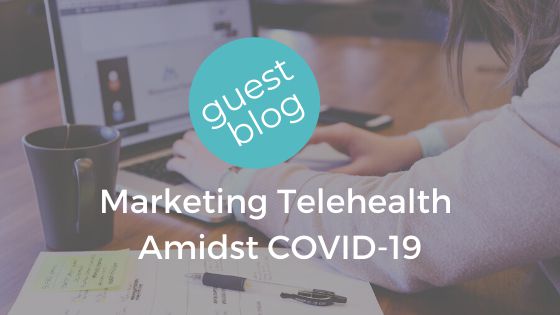Marketing Teletherapy Amidst COVID-19, Part 2
Has social distancing been cramping your practice? How do you even position your practice online to get clients in your “virtual” door for services? In Part 1 of this 2-Part series, I gave a quick review of some history and current events and showed how mental health providers’ concerns may be disproportionate to their clients comfort with online platforms.
In the advent of the coronavirus pandemic, mental health providers who usually conduct in-person office sessions are having to:
- adjust for the impact of the majority of their current clients “going online” for services
- navigate new terrain with insurance companies (who may or may not be quickly providing parity in remuneration for tele-mental health services)
- acclimate to a new level and type of “attending” to ensure there is an empathic connection with their clients
- figure out how to reach out to a new pool of “un-therapized” prospective clients who are hurting and needing mental health services
In this second installment of the 2-Part series, I will share some marketing pointers I’ve learned along the way to help other mental health providers market their services during this online climate.
My Mentor’s Mantra
“Marketing isn’t about closing a sale. It’s about opening a relationship.” This is the mantra of one of my mentors, Brand Marketer, Mike Kim. When I first heard him say this, I realized that he’d identified something I’ve known for a while but had not fully understood:
People want to connect with those who care about them.
In particular, people who are in pain really want to connect with those who they feel care about them. As mental health providers, we are skilled in conveying unconditional positive regard to our clients who are in mental and emotional pain. Our heart is to be of help to them. But with COVID-19, social distancing, and more people are engaged with “hanging out” on social media platforms – why aren’t more mental health providers joining them?
One could cite issues of privacy, confidentiality, boundary maintenance, state and federal laws. But I would like to submit the notion that, for the most part, most mental health providers are afraid of (or not fully comfortable with) the social media landscape.
The antidote to fear is exposure and P.R.A.C.T.I.C.E.
As with any “exposure therapy,” its effectiveness is increased if it’s metered out within a framework of understanding the process. I will now outline the 8 essential tips for establishing your P.R.A.C.T.I.C.E. online using social media.
Social Media Marketing 101
Pay attention to your intention: As you think about establishing your presence on and engaging through social media, it’ll be important to ask and answer the following question: Why do you want to be on social media?
I’d asked myself that question after I’d completed the manuscript for my (now) best-selling book, What Mothers Never Tell Their Daughters. I’d thought, “I wrote it. Now what?” So, initially, my “Why social media?” answer was, “I need to get the word out about my book.” The thought felt as overwhelming as did the landscape…initially. Think of it like driving onto a 5-lane highway in heavy traffic. So, taking your time will also be important.
Recognize your uniqueness: Because the Internet “highway” is so crowded and moving so quickly, the temptation and misperception is to look at everyone else and think there is no room for you.
The fact is that there is room for you. BUT, you first need to identify and be settled on who that you is…that unique you. It is that “you” that you bring to the specific unique work that you do. And to draw upon Carly Simon, “Nobody does (you) better…” than you.
Activate your avatar: In marketing, an avatar is another way of saying “your ideal client.” When it comes to marketing, you have to “market with the end in mind.” Ask yourself: Who is the kind of client you (really) want to end up attracting?
Once you compile that “list,” then you need to determine where such clients “hang out” in landscape of social media.
Create effective copy: Copy is the marketing word for “what you write” or “the words” you use to tell your story. Yes, your story. People want to work with you, not a modality.
Track your touchpoints: Touchpoints are those indicators that you are making a connection you’re your avatar. Numbers don’t lie…that is, unless you’re not paying attention to them.
So, it’s important to pay attention to and track the metrics that each social media platform has such as, “likes”, “loves”, “follows”, “comments”, “shares.” Even though the metrics may change, your regular assessment of those numbers ought to be constant.
Inquire for feedback: The skill—of asking questions—is something that we MHPs have in spades.
In the realm of social media, your questions need to be based on your avatar’s world. The purpose of your questions is to get closer to understanding your avatar’s needs, wants, desires, and fears.
Communicate with avatar’s words: Once you have information from your questions, then this will give you the vocabulary to use when communicating with them in their social media arena.
Execute your plan: You can have all the information in the world, but without a marketing plan, you will be throwing spaghetti on the wall to see if something sticks.
The same way a baby needs structure and a set schedule in his/her routine in order to develop a sense of safety and security, so too does a marketing plan need the nurturance of structure and consistency. The plan does not need to be grandiose, it just needs to start small and be consistent. So, don’t despise small beginnings.
Start getting your P.R.A.C.T.I.C.E. on the landscape of social media today.
We’re all in this together. Let me know how I may be of help to you.
 Dr. Michelle Deering is a North Carolina- & New Jersey-licensed clinical psychologist, nationally board-certified sport psychologist, professional speaker, podcaster (The Mom Stops Here™), and bestselling author (What Mothers Never Tell Their Daughters: 5 Keys To Building Trust, Restoring Connection, & Strengthening Relationships). She is founder and CEO of Curative Connections, a premier consulting firm in the Triangle Area of North Carolina. Help your online clients and give them this link for a copy of the FREE PDF– “QUESTION-BUSTER: 7 Questions Insurance Companies Don’t Want Your Online Client To Ask.
Dr. Michelle Deering is a North Carolina- & New Jersey-licensed clinical psychologist, nationally board-certified sport psychologist, professional speaker, podcaster (The Mom Stops Here™), and bestselling author (What Mothers Never Tell Their Daughters: 5 Keys To Building Trust, Restoring Connection, & Strengthening Relationships). She is founder and CEO of Curative Connections, a premier consulting firm in the Triangle Area of North Carolina. Help your online clients and give them this link for a copy of the FREE PDF– “QUESTION-BUSTER: 7 Questions Insurance Companies Don’t Want Your Online Client To Ask.







